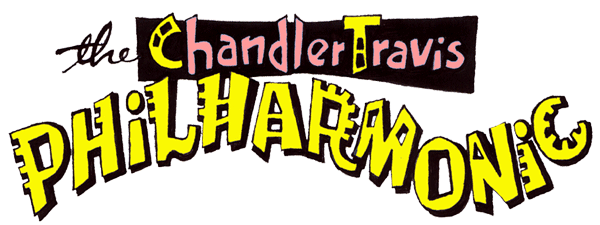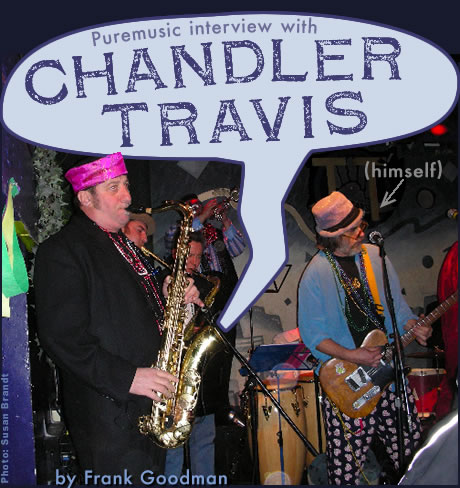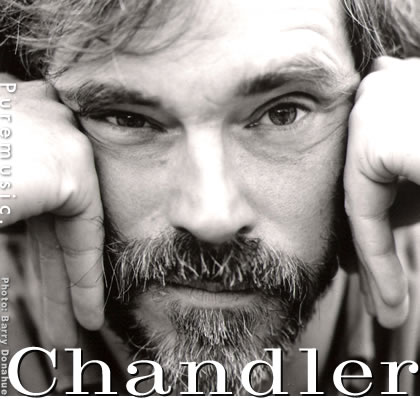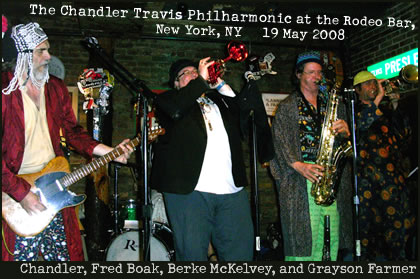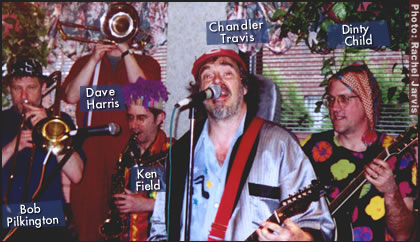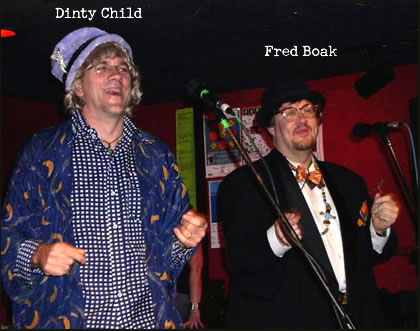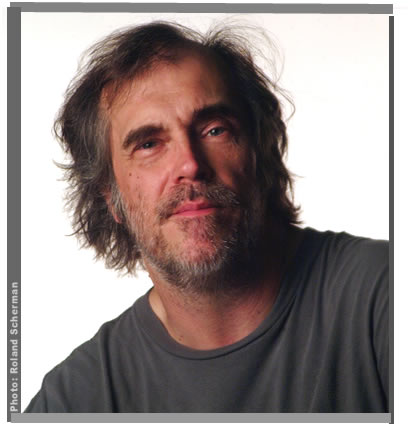It was the last time that I went to Folk Alliance, this singer songwriter convention. It was in San Diego that year, February of 2004, that I first ran into Chandler Travis.
Several floors of a moderately good hotel are rented out by the convention, and myriad rooms are hosting “showcases” where a singer songwriter or small combo can be seen, heard, and hired by a prospective agent from another state or country. So, I was hurrying between two rooms, either to play or see someone play, and passed a room where a good jam was happening, and it looked like people were standing around in pajamas and top hats. “Hmm… have to go back there.”
And sure enough, a friend walked me back there later. This eclectic bunch called The Chandler Travis Philharmonic were playing some of their own way out great songs, and were backing up others playing theirs. Then a friend suggested to them that they get me up for a song, so I played one called “If Love Turns Its Back On You.” They subsequently began a feature on their website called “Love To Turn You On” which features tales and mp3’s of different grooves or songs they have unearthed. Our fortuitous meeting in this song was the first clip that went up on this page. I heard some great songs that night, and made some friendships that persist to this writing.
I had the great fortune of being in NYC recently and a scan of the Village Voice listings revealed that indeed the Chandler Travis Philharmonic was in town and would be playing at The Rodeo Bar that night. Although our first meeting was memorable and the CDs compelling, live is where and how this unique and masterful ensemble needs to be seen! In between outrageous songs, Chandler will shed yet another pair of pj bottoms; I think I saw at least half a dozen. And all the players get to play and Do play terribly well. One of the best shows in recent memory. So get this latest record, Kitty, but get clued into their website and side projects, and know when the Chandler Travis Philharmonic is coming to town, because that is something you don’t want to miss, ever.
A Conversation with Chandler Travis
Puremusic: So rest assured that in the setup of this interview I will describe in detail the circumstances of our first meeting.
Chandler Travis: That was so much fun.
PM: Oh, yeah, that’s part of setting the mood.
CT: Yeah.
PM: And let me say that it’s a very fond and special memory, running into the Chandler Travis Philharmonic in a Folk Alliance hotel room.
CT: Oh, same here, that whole bunch is very close to my heart. We’ve been trying to get back these last couple years. It’s just hard for that big of a band; they make it kind of hard.
PM: So I looked back, and that indeed was 2004. Have you been back since then?
CT: Yeah, once. Now, when we did it with you it was in San Diego, right?
PM: San Diego it was, right.
CT: We were back once in Austin. And other than that we haven’t done it.
PM: In San Diego I remember first being in a big hurry somewhere, running through the hall when I heard good music coming from a room, and when I passed by I saw guys playing in pajamas and top hats and thought–
CT: [laughs]
PM: –“hmm, definitely have to go back there.”
[laughter]
CT: Yeah, yeah. I’m dying to do that again. I just really like fucking with those people.
PM: So although both solo and as a founding member of Travis Shook and the Club Wow, you toured all over the country and beyond, do you identify yourself as a Boston player, or a Cape Cod player, or New England or how do you–
CT: Yeah, sure.
PM: One or the other, or all of the above?
CT: Well, it depends on where I am. It depends on whether people know the difference between Cape Cod and Boston.
[laughter]
PM: Yeah, exactly.
CT: It’s whatever is handy.
PM: I think the genre you’ve literally founded is fittingly original, “alternative Dixieland.”
CT: Well, you know how it is, you spend all your time trying to do something that no one has done yet, and then people ask you for some kind of label for it. And the “alternative Dixieland” was actually something that somebody else came up with. But I thought it was a great way of saying it.
PM: It’s really funny.
CT: Lately we’ve taken to calling it “gospel music for atheists.”
[laughter]
PM: Because, really, like your friends NRBQ, the wonder of the band is that they’ll incorporate many styles of music in any evening’s entertainment.
CT: Sure, yeah. Well, and again, like those guys, it’s partly just being voracious listeners and record collectors. And obviously as a musician, when you hear something you love, you want to figure out how to play it. And then once you figure you’re close enough [laughs] you try and lord it over everybody else.
PM: I feel really lucky that I happened to be in New York City when you guys were booked at the Rodeo Bar this past Monday. That was a phenomenal show.
CT: Oh, such a gas seeing you, man. Everybody was just–well, I guess not everybody, but me and Fred and Dinty were just so excited to see you. Frank Goodman! Yeah! All right!
PM: It was so exciting to see the band live. Some bands need to be seen more than others, but certainly the Philharmonic, it’s a must-see thing. The records are great, but it just needs to be seen.
CT: Yeah, well, we’re always so far ahead of the records. I just write a lot. So best case, if you’re listening to the records, you’re going to be listening to two years ago.
PM: Right. You are a very prolific person, then?
CT: Well, it doesn’t really feel like that much, but I guess sort of–I don’t know, that’s what people keep telling me. The thing is that I don’t really think I write a whole lot more that I like enough than about an album a year. I don’t really think I’m all that prolific, relatively. I just took a lot of years off. So there’s nothing extraordinary about it. It’s just pretty much the same clock everybody else is on.
PM: Are you always that many pieces, or do you also gig in more stripped-down versions?
CT: Well, as you know, because we did the Folk Alliance, yeah, I’ll put something together for whatever I can do. If it’s called Philharmonic, it’s usually at least seven pieces, and that’s our usual lineup is what you saw: eight pieces plus singing valet.
[laughter]
PM: That is really amazing. Who does those unbelievable horn charts?
CT: Well, a few people do, different horn guys, Keith Spring has done a few of them. Ken Field did a few of them, an alto player who wasn’t with us the other night. Mark Chenevert, our usual horn leader who also wasn’t with us the other night, has done a bunch of them. Bob Pilkington, our trombone player who was with us the other night has done them. I’ve done a few of them, just by singing parts to other guys. And I’m a constant meddler with other people’s work, for better or for worse.
[laughter]
PM: Who was that trumpet player on stage the other night? He was awful good.
CT: That was Grayson Farmer.
PM: Yeah, Grayson Farmer, I like that.
CT: Yeah, he’s the only guy up there who really hadn’t been with us all that much except for that week, and maybe three or four other gigs other the years.
PM: He had a nice sound.
CT: Oh, he’s a good player, yeah. And if you’re going to write something about us, by all means, try and get some stuff in about the players, because that’s something that gets overlooked.
PM: Well, yeah, we ought to talk about the players, then.
CT: Yeah.
PM: Because what I’ll do, really, we’ll do this interview, and I’ll run it as it was. I’ll trim it up some. Say whatever we say about the players.
CT: Well, the Philharmonic is all about the players. I mean, obviously, there’s a lot of songwriting things going on and whatever, but it wouldn’t exist, literally, at all, without the players. The players came first. I never would have started a horn band on purpose.
PM: So how did it, then, literally begin? Was it you and Dinty Child at first?
CT: Yeah. There’s something on our bio about it. It was just Dinty had some kind of series in Cambridge where he sort of had a rhythm section. I don’t know if it was one night a week, he would have different guys some down and sort of guest star in front of this rhythm section. And it was his habit to ask occasionally, “What else would you like? Is there something else we could throw in there?” And I think just because I probably didn’t have a real idea, and also maybe because there were a couple of songs I’d written right around then that sort of had me thinking about horns a little bit, but I think it was probably more of a devil’s advocate thing than anything else, I just said, “Yeah, well, let’s do some horns.” I mean, at the time it was–I mean, I’ve always thought of horns and also girl background singers as the last gasp of the aging rock ‘n’ roll band.
PM: [laughs]
CT: There are so many guys that have done such awful work with just lopping those things on after they’ve stopped writing anything that makes any sense.
PM: Yeah, right.
CT: I love Stax.
PM: Can’t go wrong.
CT: Oh, great fuckin’ band. I mean, I’ll listen to those records all day, and it’s great. But there’s more than one way to look at horns. If you listen to Sun Ra, you listen to Duke Ellington, you can listen to old Dixieland and Louis–there’s so much out there, it just seems insane to me what tunnel vision people in rock ‘n’ roll seem to have about horns.
PM: Truly.
CT: Especially when you consider that rock ‘n’ roll is by nature raucous music. And the Stax thing, it’s great stuff, but it’s very controlled; it’s very restrained, really.
PM: Oh, yeah.
CT: Like I say, nothing against that, because I love that shit. And especially for me, it’s the rhythm section on the Stax records that really makes that thing real special. But it’s all great. I just think there’s more than one game in town.
PM: And certainly the horn sections and the horn charts of the Philharmonic are truly original, outside and really genre bending.
CT: Well, it’s not just charts, is part of the thing.
PM: It’s playing.
CT: That’s what I like about the Dixieland part of it, it’s just three guys just blow. And I enjoy what happens with that sometimes.
PM: Yeah, it’s fuckin’ unbelievable.
So let’s talk about a couple of the other players. How about that fantastic drummer, Rikki Bates?
CT: Oh, yeah. Well, Rikki–I’m the only guy I know who gets to play with his first-choice drummer. Everybody else just gets to dream.
[laughter]
PM: He’s a phenomenal player.
CT: Yeah, yeah. And a true nut. He’s been with me, for, damn, almost 30 years.
PM: Wow.
CT: We took a few years off at one point. But he’s the best. I mean, especially for musicians. I mean, anybody who is a musician checks him out and just goes, “Oh, my God.”
PM: Yeah.
CT: So that’s good fun. And part of the thing with Rikki, and part of the thing that’s special about the band, in trying to find the right people for the band is trying to find the people that can play with a sense of humor, that can play silly.
PM: Right.
CT: Which is a very tricky thing, really. It isn’t if you’re born that way. But if you’re not, there’s nothing you can do.
PM: Right. You can’t learn that.
CT: No.
PM: He’s a very tonal drummer.
CT: Yeah.
PM: He really gets a lot of notes going on out of his drums. I really like that about him.
CT: Oh, God, yeah.
PM: When I was hanging out with him–I mean, when you’re talking to a guy who’s a cross-dresser, it’s like you just keep triple-taking and double-taking, going, “Okay, I don’t know exactly how to get with this, but this guy is just unbelievable.”
CT: Well, you can understand why I’ve always wanted to spring him on the Folk Alliance.
[laughter]
PM: Rikki Bates is one of those guys that when you watch him play, he doesn’t look like he’s making all the sounds he’s making. You know what I mean?
CT: Yeah. Which is something you don’t see every day, in a drummer or anyone else.
PM: The very existence of the band speaks to an entirely different ethic and motivation than what’s generally regarded as the music business today.
CT: Well, yeah, it does. And that’s me being lucky enough to do that. My folks are fairly well off, I own my own house, so I have it better than a lot of people. So it’s a privilege to get to not worry about how much money I’m making on every gig. Everybody else has to worry about it, just like normal people.
PM: But you don’t, and that’s nice.
CT: Well, it’s very lucky for me, and I hope lucky for my audiences.
PM: Since he’s like the center of the band, let’s talk a little bit about Dinty Child. He’s a fascinating instrumentalist.
CT: Yeah. Well, he plays everything. He’s certainly–I mean, there’s a lot of kinship there. We sort of feel like brothers, in a strange way. For one thing, we both really love parts. We both really like the idea of something that’s so great that you play that every time. And also Dinty is a terrific guy at knowing that you don’t have to play all the time, and that with nine people, in fact, it’s really important that you don’t play all the time. I’ve known a lot of terrific players who don’t know to lay out a little bit, maybe the verse before your solo, lay out, man, set your stuff up. Some guys just don’t shut up. And in my band it’s been a real lesson in that. I mean, we’ve got three rhythm players, we’ve got keyboard and myself and Dinty, so we really can’t be all clattering away all the time.
PM: Ever since I saw him the first time playing in the Folk Alliance hotel room, I’ve wanted a mandocello. I haven’t gotten around to buying one yet.
CT: I know, isn’t that the best instrument?
PM: Wow, it’s got a great voice.
CT: I was fortunate enough to–there’s a guy up here who plays with me sometimes called Tim Dickie, and I actually played with him before I played with Dinty. And another guy who lived like a block from me, named Rich Hardy, who played on one of the early records. And they both played mandocello. So at one point I had access to three different mandocello players, which is just strange.
PM: Crazy. And like where are they getting these mandocellos? I remember hunting one down with Dinty one time. There was a maker whose name now escapes me. Did the other guys–what kind of mandocellos were they playing? Do you know?
CT: Oh, hell no. I have no idea.
PM: I’ve got to get one of those things.
CT: I know. Aren’t they great? And the thing about them that I think is so cool, they’re just so strong sounding, man, it’s such a rock ‘n’ roll kind of instrument to me.
PM: And does everybody play it with a plectrum? Or do they fingerpick it, too? Or what–
CT: All my guys have played with it pick. I have no idea what’s typical. I really haven’t heard mandocello except for these guys that I know. I haven’t really heard any on–I mean, I probably have, I suppose, but it’s not something I noticed on a record and went, “Oh, we’ve got to find somebody who does that.” I was just really lucky.
PM: And since he’s a big part of the vibe, let’s talk about Fred, too, Fred Boak.
CT: Yeah, yeah. Well, Fred came to see us as a fan for like a year or two. And then it was so great to have him around. He started selling merchandise, and then slowly started doing more and more. He’s just completely made himself indispensable at this point. He’s a lot of help on the web, and he’s a great harmony singer, and a terrific presence on stage.
PM: He’s an amazing presence on stage.
CT: And he just does more and more every year. And I think in a few more years he’ll probably just run the band.
[laughter]
PM: How often does the group in some form rehearse or record?
CT: Almost never.
PM: Almost never, right? It’s like that.
CT: Yeah. We have to do things piecemeal, because people need to be out there making a living. And needless to say, you don’t get paid much for Philharmonic sessions, or Philharmonic gigs, for that matter. So it’s always been a matter of looking for guys with nights off. And we’ve got a pretty deep list, especially horn players. I try not to mess with the rhythm section that much.
PM: There’s a strong connection or connections between the Philharmonic and NRBQ, as well as with The Casuals. Would you run that down for me exactly? What is the connection there?
CT: It’s just that Rikki [Bates, drummer] and I both play in The Casuals, is what that is. And NRBQ–well, Keith Spring was our keyboard player up until about a year ago, and still plays on some of the recordings. He’s actually Rikki’s roommate. And Keith was a formative NRBQ figure, played in the Whole Wheat Horns for years, and then was an amazing saxophone player; he also produced three Martin Mull albums, and a few other things. And then at some point he decided he needed to be done with saxophone; he sold his saxophone and became a keyboard player, which to me is unfathomable. But he’s a great keyboard player, and he still does great horn arrangements, and is a good old curmudgeon.
PM: That’s so interesting, that a person gets done with an instrument and just moves to another one.
CT: I can’t believe when that happens. I remember when we used to play a little bit with Bill Keith when he used to work with Jonathan Edwards. Actually, the first time I ever heard a steel guitar in person was at some TV show that we were doing with Travis & Shook, and I heard it down the hall. And I just couldn’t believe what a heavenly sounding thing it was. It just didn’t sound remotely–
PM: It’s my favorite instrument.
CT: It’s pretty cool. The part that keeps it from being my favorite is that it’s really pigeonholed, it’s either country or Hawaiian. It doesn’t get out of that much. But boy, it’s an amazing thing to hear. And I couldn’t believe when Bill Keith just stopped playing pedal steel in favor of banjo, which is one of my least favorite instruments. That was just completely–I just did not understand that at all.
PM: Oh, see, I love the banjo, too.
CT: But I mean, when I say my least favorite, there’s still–I mean, I’ve used banjo on a couple records. It’s like genres, it’s like okay, I don’t really know shit about opera, and I hate most of it, but every now and then I’ll hear something that will just blow my mind.
PM: [laughs] I was a huge Captain Beefheart fan growing up. Were you?
CT: Not huge. I mean, I certainly tried to keep up with that, and I did see them once or twice. And he’s obviously great. As far as what’s close to my heart, he’d be a ways down the list. But I love a lot of the stuff that he did.
PM: Because I thought I heard some influence there. But no, it probably comes from–what I was hearing as Beefheart was probably like Sun Ra and some jazz guys.
CT: Maybe. I also get this Zappa thing a lot, and I’m not a Zappa fan really at all. I’m more of a Bonzo Dog Band guy, if anything. But the thing is, it’s so funny because people have so few reference points for if they want to describe something and say, “Well, this is kind of silly.” You know what I mean? It’s like all they’ve got is Weird Al and Frank Zappa, and then there’s like two or three others, and that’s it.
PM: There’s very little.
CT: So there’s not much to pick from.
PM: Yeah, that’s odd, isn’t it.
CT: It’s strange. And there are some Zappa things I like, but to me he was a peculiarly humorless humorist.
PM: [laughs]
CT: I thought he was a great interview.
PM: Yeah, he was an exceedingly mental character.
CT: Yeah, and an interesting guy. There’s certainly some interesting music. But I found a lot of his stuff really academic.
PM: Yeah. I listened a lot to your last CD Kitty, and the 40-plus cuts on it today.
CT: Oh my, so sorry.
PM: [laughs] One is struck, of course, by how different your songwriting is than anybody I can think of. How do you think it turns out that way?
CT: I don’t know. I must have just derivatived it to death or something. I’d like nothing better than to be original, but to me all I hear is steals and influences. I certainly hope that somehow it ends up being something different, and I’ve always sort of trusted that maybe it would be.
PM: I certainly think it is, yeah.
CT: I’ve always thought it was pretty rootsy and derivative. I try.
[laughter]
PM: So are there DVDs available of CTP?
CT: No, not really. There’s a bunch of stuff up on our website and there’s a bunch of stuff up on youtube. Maybe one of these days. But to me, that’s sort of like making T-shirts. To me, that’s not the business I’m in.
PM: Right. And it’s also a little bit like filming a play. You’re not supposed to do that.
CT: Yeah.
PM: So I’m not sure if that’s right or not, but I thought I’d ask.
CT: No, I completely agree with you. We did one gig where we had a couple of cameras on it. And that helps a lot. Needless to say, watching anything with just one camera is really tough.
PM: Yeah, that’s not good, yeah. So is it about time for a new record? Are you planning that?
CT: I’ve really been trying hard not to put a record out there. Because it’s like you said, I’ve been getting this “prolific” rap a lot, so as soon as people say you are something you don’t want to be that. It’s really hard because I’ve really been writing a lot. [laughs] But I’m going to really try not to put a record out there this year.
The next record is going to be pretty different, too. I think it will be probably a solo record, although there’s about three or four different live records waiting to come out. But I think the next one is going to be a relatively quiet solo record.
PM: Oh, I’d love to hear that, because, yeah, I became a much even huger fan the other night. I’m really glad to talk to you in this way today. And I look forward to the new record, and I look forward to turning the readership onto Chandler Travis and all that you do.
CT: Oh, man, thanks for spreading the word. Like I said, we were certainly thrilled to see you in New York.
PM: [laughs] Okay. Well, I hope to get up to see you one of these days soon up in your neck of the woods. And say hi to the fellows for me, and let’s keep in touch.
CT: I sure will.
listen to clips – print interview (pdf)

